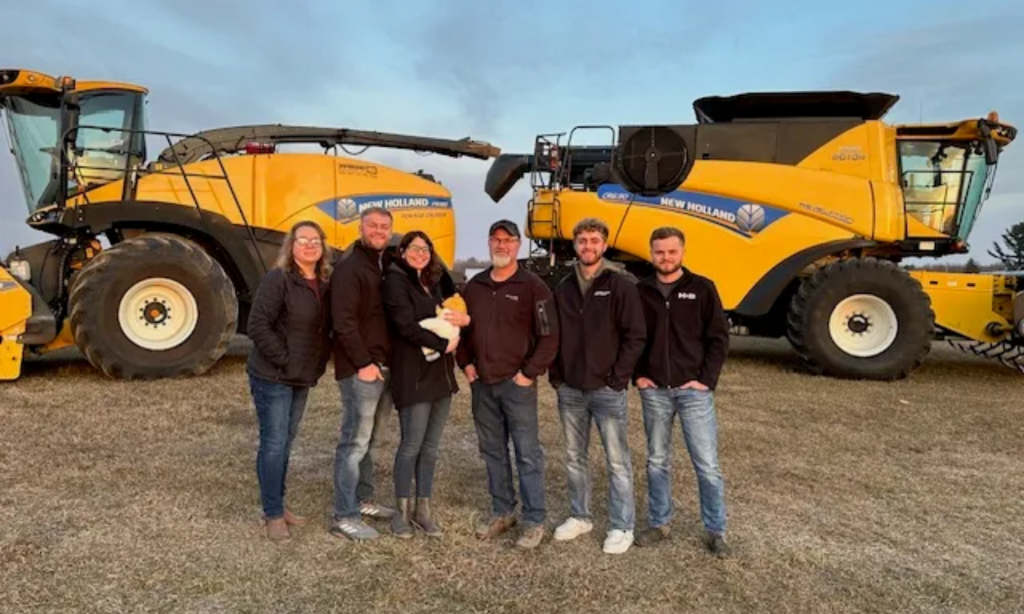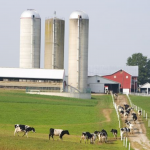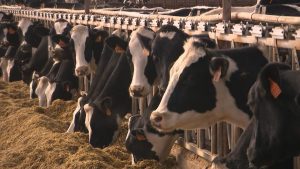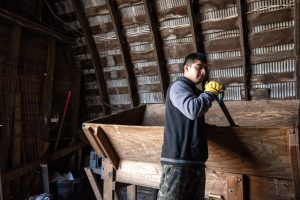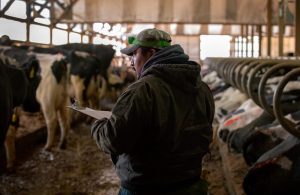
However, Glendale Farms in northeastern Waupaca County is unique because it has a modern 300-cow dairy, and also features 30 acres of strawberries, along with raspberries, several varieties of peas and other vine-ripened produce that customers can either pick for themselves or purchase freshly picked.
The diversified farming enterprise has kept the family working together across six generations.
Decades of growth and diversification
Like many of today’s family operations, Glendale Farms, Inc. grew from humble beginnings. In 1893, E.W. Zell and his wife, Katherine, purchased a small area dairy farm after emigrating from Germany.
Their daughter, Myrtle, and her husband, Paul Kluth, became the next owners of the farm, maintaining a dairy herd, while raising hogs and laying hens.
Paul and Myrtle’s son, Glenn Kluth, and his wife, Beatrice, became the farm’s third generation owners. They expanded the dairy operation but discontinued raising hogs and chickens. Glenn also did custom combining for neighboring farmers.
Glenn and Beatrice’s son, Dale, and his wife, June, became the farm’s fourth generation owners. They expanded the dairy herd, and also purchased neighboring acreage to add to their land base. In 1977, the operation was incorporated as “Glendale Farms.”

The beginning of the produce enterprise
In 1978, Dale and June made the decision to grow strawberries and began with an eight-acre patch that has expanded to 30 acres. Three varieties of peas were later added as products available for their customers during the strawberry season.
In 2004, Dale and June retired yet still continue to live nearby. The farm was taken over by their son, Steve, and his wife, Tammy, marking the family’s fifth generation on the farm.
“We met in the strawberry patch, and now we’ve been married 32 years,” said Tammy.
The couple has three adult sons, Cody, Connor and Colton, who began participating in the business when they were young by raising and selling onions. Cody and Connor are the sixth generation actively involved in the farm, while the youngest son, Colton, is a forester whose work involves traveling throughout the country.

Modernizing the dairy farm
While Glendale Farms is best known for its strawberries, raspberries and other produce, the dairy operation continues to remain an important component of the farm’s success. A modern freestall barn was built in 2005, and the old barn was remodeled to house young stock
“Currently, we’re milking 300 Holsteins twice a day in a double-8 herringbone parlor, with a herd average 92 pounds of milk,” said Cody, who has been managing the dairy operation for 10 years. “We raise our own herd replacements, but we have a very low cull rate so we’re able to sell all the bull calves and most of the heifer calves.”
Alfalfa and corn silage comprise the bulk of forage for the animals.
“Currently, we’re harvesting 200 acres of corn silage and 180 acres of alfalfa for the lactating herd, and we harvest 70 acres of mix grasses for the dry cows and heifers,” said Cody. “All the planting and harvesting is done in-house, but we hire a custom operator to apply the manure.”
The dairy team includes two full-time milkers and a part-time employee who helps with milking.
“My brother, Connor, helps wherever he’s needed,” said Cody.
Work goes on before and after the harvest season
Just as with the dairy enterprise, work for the field crew handling strawberries and other produce takes place over several months each year.
“We’ve offered our customers 30 acres of strawberries for the last 20 years, and we’ve expanded into raspberries, asparagus, peas, beans, onions, sweet corn and kohlrabi,” Steve said. “Sweet corn and other out-of-season produce are advertised on Facebook and we take orders for customers to pick up because we’re not really open during that time of year.”
To maintain the highest quality strawberries, the beds are kept in production for only three years.
“We replace about 10 acres every year, so we always have berries of different ages,” Steve said.
“There’s a lot of work involved in establishing new beds,” he added. “After we plant them we pick off the blossoms that first year because we want them to fill in with runners to make a row instead of having them trying to make berries.”
The beds require a lot of weeding throughout the summer.
“This includes a lot of hand weeding, pushing in runners to establish rows so people will have easy picking the following year,” said Steve.
Picking time is busiest time of the year
While much work takes place throughout the year, there’s nothing to compare with the flurry of activity that occurs from early June through mid July as the Kluth family members and their large staff prepare to welcome hundreds of customers daily who come to pick or buy pre-picked strawberries, raspberries, peas and beans.
“We employ about 50 people between the pickers, sales staff and field staff,” said Tammy. “These include high school students, college students, retired teachers and current teachers who have the summers off. We have many who come back to work year after year.”
During harvest time, Tammy takes vacation days away from her regular job as a buyer for H&S Manufacturing, where she purchases a variety of parts used in the manufacture of forage handling and other farm equipment. She also maintains the farm’s financial records.
“I’m one of the many farm wives working off the farm for insurance,” she said.
Tammy says 80-85% of their customers pick their own berries, but adds, “The number of customers who buy the pre-picked has been growing in recent years.”
For many, picking berries is a family outing.
“A lot of families across several generations come out and pick together,” said Tammy. “They can also pick three varieties of peas, garden, sugar, snap and snow peas, along with green and yellow beans. And as the strawberry harvest winds down, the raspberries get ripe, and customers can also pick their own.”
Be sure to call before you come
Glendale Farms is currently open daily from 7 a.m. to 5 p.m., but picking hours and days are dependent on the supply of ripe berries. Steve also expressed concern over the potential harmful effects the recent heavy rain might have on this year’s crop.
“While the berries need moisture, they also need time to dry out.”
A daily recorded berry report is available by calling 715-823-4287. Additional information is available by calling 715-823-4187, and on their website: www.glendalestrawberries.com.
Glendale Farms is conveniently located three miles southeast of Clintonville, off County Road I, east of US 45 on Kluth Road. When berries are ripe for picking, customers will stop at the sale shed, pick up their containers and receive picking information. Tractors and wagons are available to transport customers to designated picking areas, and return them to the shed for checkout.
While Glendale Farms is currently operated by fifth and sixth generation members of the Kluth family, Cody and his wife, Hattie, have recently added a seventh-generation family member – their four-month-old son Gram (Ingram). So, hopefully the family’s farming legacy of berries and dairying will continue well into the future.
